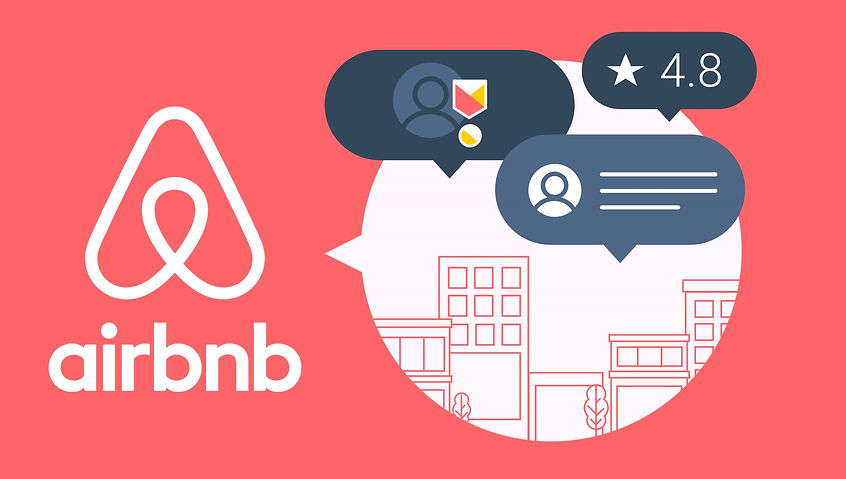top of page
Airbnb

Airbnb
Timeline
2 week Sprint, Fall 2021
Role
UX Design
Improve current platform to ensure safety for guests & hosts alike
The Airbnb community relies on honesty and transparency. The platform has been designed to get to know hosts, homes, and experiences before booking. Several events involving safety brought up concerns. Both guests and hosts want to feel secure during the Airbnb experience. The focus of this project is to build trust between both users.
The challenge
Trusted rating system
Airbnb's current rating system is traditional and like many others. Written reviews and star ratings are what hosts need to thrive in the marketplace. How might we improve Airbnb's current rating system to provide clarity between guests and hosts?

Successful systems
In order to redesign Airbnb's current rating system, I conducted a competitive analysis of rating systems that thrive in the market today.

Online booking marketplace
Not only was it important to look at rating systems, but I also researched direct competitors. The deep dive into competitors revealed how rating systems affect the online booking experience. The rating systems allow transparency for the user and can provide security with booking.
.png)
Understand the business
To better understand Airbnb's business, I conducted a SWOT analysis to have a bird's eye view of where there are strengths, weaknesses, opportunities, and threats.

Safety for users
To establish trust for the guests, Airbnb has implemented specific features. These features are designed for safety both on and offline. Along with the features listed, Airbnb encourages users to lean on profiles, secure messaging, and reviews to better know your hosts.
1
100% Verified
Homes will be verified for accuracy of the listing and quality standards
2
Guest Guarantee
If upon checking into a listing it does not meet our accuracy standards, Airbnb will rebook the guest a new listing of equal or greater value, or they will get 100% of their money back.
3
Airbnb Neighbor Hotline
24/7 Neighbor Hotline so that anyone can call us anytime, anywhere in the world and reach a real person at Airbnb
4
High Risk Human Review
Manual screenings of high-risk reservations to prevent unauthorized parties

Understanding the business and user relationship
To ensure that Airbnb's business and rating system aligned with the user's needs and goals, I used a value proposition canvas to map out the positions between the guest and host.

Product Goals
Keeping the user's needs and goals in mind, I started to map out product goals before ideating. These areas of interest sparked many ideas for Airbnb's current rating system. I organized these ideas through idea prioritization.
1
Incentives
Create a system that will incentivize users to leave reviews. Rewarding users can motivate a user to leave a review.
2
Building Trust
Having status visibility can build trust for both users and hosts. Profiles that have great reviews are connections of trust.
3
Personalization
Personalizing the experience for users. Creating custom rewards and badges. Users can redeem the rewards to apply for future stays.
4
User Retention
Hosts can benefit from a reward system for guests. The system will allow guests to return based on the redemption of points.

Prototype Concept
From the idea prioritization exercise, I came up with a viable solution to increase trust between the host and the guest. Airbnb's current reputation system caters to hosts and does not provide a pillar for guests to climb. Hosts want to ensure that their stays are kept by well-behaved guests. To incentivize guests for good behavior, a gamification reward system should be put in place to encourage gust etiquette and allow guests to benefit more from the service.

User Journey
Now that I've established the prototype concept, I designed a user journey to map out where users (guests) would gain points for the loyalty program. The marked boxes in the user journey indicate behaviors that can help the user gain points. Points will be tallied up and can help the user achieve a Super Guest badge.
.png)
Final Design Composition
From the user journey, I finalized the screens to the final prototype. Although the user journey follows the guests' journey, I wanted to also show the prototype from the hosts' side.
Prototype - Guest

Prototype - Host

Project takeaways
Gamification is the key to a successful reward system
To build trust between hosts and guests, I wanted to implement a reward system. Airbnb's current rating system is traditional and, like many others. Hosts thrive on the marketplace over guests. They rely on written reviews and star ratings in hopes of gaining a Super Host badge. I wanted to create a system where guests could benefit. The reward system will bridge the gap between hosts and guests. Implementing gamification can incentivize guests to exhibit good behavior, thus, creating trust between the host and guest. The reward system will allow guests to redeem their points for a customized experience. This will allow the guests to book again and redeem their points for their next stay. This can not only create trust but, also retain customers for the hosts.
bottom of page
